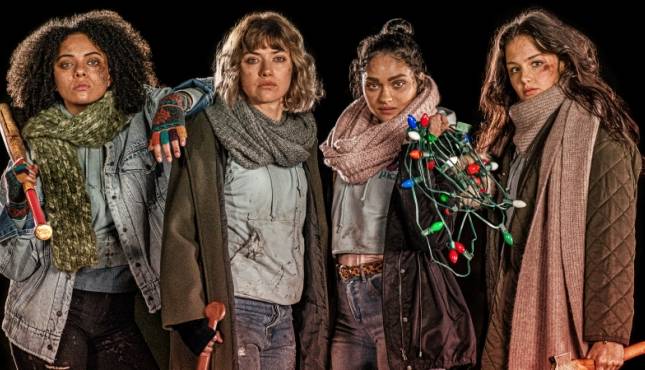Movies & TV / News
Black Christmas Director On How Her ‘Fiercely Feminist’ Remake Differs From the Original

Black Christmas director Sophia Takal spoke with EW for a new interview discussing the remake, how it differs from the 1974 original and more. Highlights are below:
On the film’s story: “My version of Black Christmas is about a group of women who are sorority sisters at a college, who start to disappear one by one. The remaining sisters have to figure out why these women are disappearing and who’s responsible for it. And eventually, once they figure out who the bad guy is, they have to fight for survival.”
On Imogen Poots’ character: “Imogen plays a woman named Riley, who is a sexual assault survivor who has retreated into herself after this traumatic experience, and then throughout the film sort of gets her power and strength back and learns to fight again and reclaim herself. Her best friend, played by Aleyse Shannon, is a woman named Kris, who is a very, very vocal, fierce feminist, who I’d say at times verges on pushy and impatient when the other women aren’t as willing to fight back as she is. She and Riley are really the dynamic duo of the film. The two of them, despite their differences, learn from the each other. I can talk about some boys! Because there are men in the movie. Caleb Eberhardt is an actor who plays Landon, who is a kind of hapless cutie-pie [laughs], for lack of a better word, who has a crush on Riley and wants to be a good man, and is struggling and sorting out what that means in 2019.”
On the differences from the original film: “You know, this movie, even though it’s very, very loosely based on Black Christmas, I’d say the plot is extremely different. It’s more inspired by the feeling that Black Christmas made me feel watching it, this idea of misogyny always being out there and never totally eradicable. So that was the jumping-off point for how I came up with this plot. I’d compare it more to how Luca Guadagnino remade Suspiria than to a straight-ahead remake. The original Black Christmas feels so contemporary and modern for the time. Since then I feel like there have been so many movies about sorority sisters where the women have been portrayed as dumb, bimbo-y idiots. What I love was this was a group of women who, even though there was some conflict and strife — you know, Margot Kidder was a real spitfire [laughs] — they were all very much three-dimensional, strong female characters. I wanted to make something that reflected our time right now, drawing more from what the original evoked for me rather than great plot points. For me, it was about what does it feel like to be a woman in 2019?”
On the film’s female writer and director are felt in the film: “I would say so. I would definitely say so. Yes. I feel like another part of why I kind of shifted the direction that this version took was because, in 2019, I didn’t just want to make a movie about a bunch of women getting slaughtered. It just gave me a pit in my stomach. This is not to say that a man might want to see that. I just think I felt very much a responsibility not to perpetuate this idea of disposable female characters, because of how it makes me feel when I watch that. I call this movie a fiercely feminist film, so I don’t mind being asked about that at all.”
On what’s next for her: “I hope to work with Blumhouse some more, but I’m also interested in maybe shifting away a bit from straightforward horror and finding other genres to work in, and also maybe making movies about some men and exploring that. I think some of the greatest movies about men are directed by women, just as some of the greatest movies about women are directed by men. I actually think this movement of bringing female directors into the fold isn’t just about women telling women’s stories, but telling stories about people who are different from them too, just as men have done for hundreds of years.”







